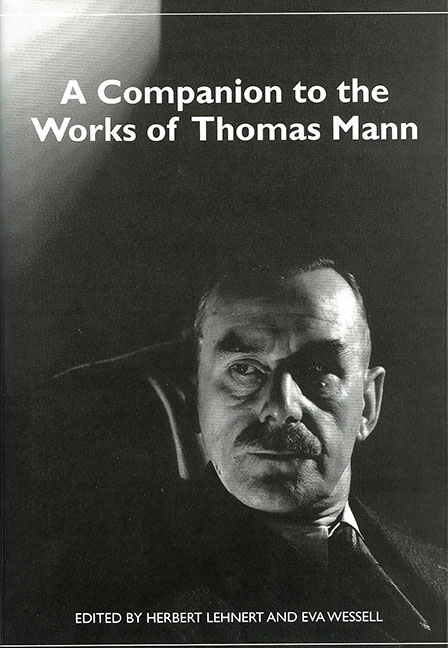Book contents
- Frontmatter
- Contents
- Foreword
- Thomas Mann's Works
- List of Abbreviations
- Introduction
- Thomas Mann's Beginnings and Buddenbrooks
- Art and Society in Thomas Mann's Early Novellas
- Love in Society: Thomas Mann's Early Stories
- “Death in Venice”
- “Mein ‘Friedrich’ — das ist was Anderes”: Thomas Mann's Unwritten Novel about Frederick the Great, King of Prussia
- Magic and Reflections: Thomas Mann's The Magic Mountain and His War Essays
- Thomas Mann's “Autobiographical” Stories
- Joseph and His Brothers
- Lotte in Weimar
- Thomas Mann's Late Politics
- “German” Music and German Catastrophe: A Re-Reading of Doktor Faustus
- The Gaze of Love, Longing, and Desire in Thomas Mann's “The Transposed Heads” and “The Black Swan”
- Felix Krull
- Female Identities and Autobiographical Impulses in Thomas Mann's Work
- Betrayed or Not Betrayed: A Testament?
- Thomas Mann's Comedies
- Notes on the Contributors
- Select Bibliography
- Index
Magic and Reflections: Thomas Mann's The Magic Mountain and His War Essays
Published online by Cambridge University Press: 28 April 2017
- Frontmatter
- Contents
- Foreword
- Thomas Mann's Works
- List of Abbreviations
- Introduction
- Thomas Mann's Beginnings and Buddenbrooks
- Art and Society in Thomas Mann's Early Novellas
- Love in Society: Thomas Mann's Early Stories
- “Death in Venice”
- “Mein ‘Friedrich’ — das ist was Anderes”: Thomas Mann's Unwritten Novel about Frederick the Great, King of Prussia
- Magic and Reflections: Thomas Mann's The Magic Mountain and His War Essays
- Thomas Mann's “Autobiographical” Stories
- Joseph and His Brothers
- Lotte in Weimar
- Thomas Mann's Late Politics
- “German” Music and German Catastrophe: A Re-Reading of Doktor Faustus
- The Gaze of Love, Longing, and Desire in Thomas Mann's “The Transposed Heads” and “The Black Swan”
- Felix Krull
- Female Identities and Autobiographical Impulses in Thomas Mann's Work
- Betrayed or Not Betrayed: A Testament?
- Thomas Mann's Comedies
- Notes on the Contributors
- Select Bibliography
- Index
Summary
Excellent Plans
On 25 March 1917, Thomas Mann wrote a letter to the Austrian literary historian and pacifist Paul Amann in which he reminisced about a problem he had encountered with a particular project he had been working on two years earlier, in 1915. The project, which had been under way since July of 1913, was a “slightly expanded short story” with the title “Der Zauberberg” (The Magic Mountain). In an earlier letter Mann had already called it a “novel” (DüD 1, 455). He found himself unable to continue the composition in 1915, he said in his letter to Amann, because the project had threatened to become “intellectually unbearably overburdened.” Although he continued to write on it intermittently, it is quite certain that he put the work down completely by January 1916 near what is today the chapter “Hippe.” Mann did not return to his project until three years later, in April 1919. Still called Der Zauberberg, the novel was finally published in 1924, eleven years after it had first been conceived.
By “intellectually overburdened,” Mann could simply have meant that his work had somehow attracted extraneous ideas that, while seemingly fitting, threatened to weaken the plot or explode the form. Mann's compositions, as his first novel Buddenbrooks (1901) shows, always stood in close relation to their historical time and place. The artist's special sensitivity to life, his “seismographic awareness,” the “secret alignment” of the “personal to the factual” that enabled the artist to transform ordinary matter into spiritual form (“Beseelung”), all of these factors could help expand a theme and make a project grow. In this case, the particular genre Mann had chosen could also contribute to the material's growth. He remembered having planned Der Zauberberg as a comedic prose work, a kind of “humoristic complement” (DüD 1, 451) or “Satyrplay” (GW 11, 607) to the somber and stylistically restrained novella “Der Tod in Venedig” (Death in Venice, 1912). Perhaps thinking of Dickens's novels, Mann expected the work to be “comfortable” at the time (DüD 1, 451), and he called it “English-humoristic expansive” when he thought about it later on (GW 11, 608). Yet he managed to complete the novel in 1924 after all, despite its continuous growth and ample intrusions by contemporary ideas during the second work period.
- Type
- Chapter
- Information
- A Companion to the Works of Thomas Mann , pp. 129 - 146Publisher: Boydell & BrewerPrint publication year: 2004

